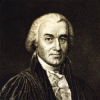Oliver Ellsworth

Oliver Ellsworth
Oliver Ellsworthwas an American lawyer and politician, a revolutionary against British rule, a drafter of the United States Constitution, United States Senator from Connecticut, and the third Chief Justice of the Supreme Court. While at the Federal Convention, Ellsworth moved to strike the word National from the motion made by Edmund Randolph of Virginia. Randolph had moved successfully to call the government the National Government of United States. Ellsworth moved that the government should continue to be called the United...
NationalityAmerican
ProfessionPolitician
Date of Birth29 April 1745
CityWindsor, CT
CountryUnited States of America
Judge candidly what a wretched figure the American empire will exhibit in the eye of other nations, without a power to array and support a military force for its own protection.
The right of the judge to inflict punishment gives him both power and opportunity to oppress the innocent; yet none but crazy men will from thence determine that it is best to have neither a legislature nor judges.
It may be assumed as a fixed truth that the prosperity and riches of the farmer must depend on the prosperity and good national regulation of trade.
A desire of gain is common to mankind, and the general motive to business and industry.
Some persons never attain to the happy art of perspicuous expression, and it is equally true that some persons, thro' a mental defect of their own, will judge the most correct and certain language of others to be indefinite and ambiguous.
The power of collecting money from the people is not to be rejected because it has sometimes been oppressive. Public credit is as necessary for the prosperity of a nation as private credit is for the support and wealth of a family.
A government capable of controlling the whole, and bringing its force to a point, is one of the prerequisites for national liberty. We combine in society, with an expectation to have our persons and properties defended against unreasonable exactions either at home or abroad.
The charge of being ambiguous and indefinite may be brought against every human composition, and necessarily arises from the imperfection of language. Perhaps no two men will express the same sentiment in the same manner and by the same words; neither do they connect precisely the same ideas with the same words.
A people cannot long retain their freedom, whose government is incapable of protecting them.
Legislatures have no right to set up an inquisition and examine into the private opinions of men. Test-laws are useless and ineffectual, unjust and tyrannical.
The Thirteen States are Thirteen Sovereign bodies.
Systems of religious error have been adopted in times of ignorance. It has been the interest of tyrannical kings, popes, and prelates to maintain these errors. When the clouds of ignorance began to vanish and the people grew more enlightened, there was no other way to keep them in error but to prohibit their altering their religious opinions by severe persecuting laws. In this way persecution became general throughout Europe.
All good men wish the entire abolition of slavery, as soon as it can take place with safety to the public, and for the lasting good of the present wretched race of slaves. The only possible step that could be taken towards it by the convention was to fix a period after which they should not be imported.
Liberty is a word which, according as it is used, comprehends the most good and the most evil of any in the world.